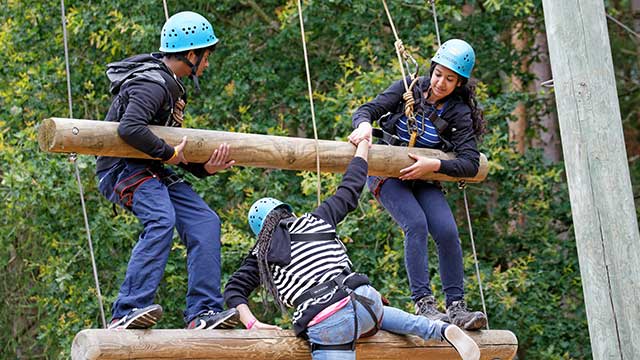Ofsted's new inspection framework targets personal development
If you've never climbed a Jacob's Ladder (see photo), you'll just have to take our word for it - it's a lot harder than it looks. The only way you can get to the top is by having two people help you; by giving you a leg up or by hauling you up - and you'll have to help them up as well. You really can't go it alone unless you're eight feet tall and double jointed! It's a perfect example of an activity which requires teamwork and communication rather than just brute force.
Inner strength
Activities and challenges such as this are the catalysts for personal development. They create the conditions for children to try out new approaches to problems and move beyond their comfort zone in a controlled and safe environment. It's through opportunities such as these that children discover their inner strength, hidden talents and learn the interpersonal skills that help them in school and their everyday lives.
New criteria
In September this year, Ofsted's new Common Inspection Framework (CIF) came into force and with it a new judgement concerning children's personal development, behaviour and welfare. Among the elements to be judged are 'self-confidence, self-awareness and understanding of how to be a successful learner', along with 'knowledge of how to keep themselves healthy, both emotionally and physically, including through exercising and healthy eating'. Schools will have to find ways of meeting these criteria if they are not doing so already.
A residential school trip is a great opportunity for schools to enable children to develop all the above. A recent report commissioned by the Paul Hamlyn Foundation concludes that residential learning experiences have a positive impact on self-confidence, wellbeing and learning.
Adaptation
For many children a school trip is their first taste of being away from home and family for any length of time. This brings its own challenges - such as adapting to a new environment, sharing facilities and space with others, and personal organisation. It can be a bit daunting to begin with, but children are resourceful and resilient and this kind of residential experience invariably brings out the best in them. Teachers regularly report that they see a different side to their pupils on a residential, with children exhibiting the very qualities mentioned in the Ofsted CIF - especially self-reliance, self-confidence and self-awareness. And it's a two way thing. Children often say they get to know their teachers better, which is great ammunition for better cooperation and understanding back in school and in their day-to-day lives.
Find out more about PGL's Personal Development courses.
by PGL Travel.
 MyPGL
MyPGL 0333 321 2100
0333 321 2100




